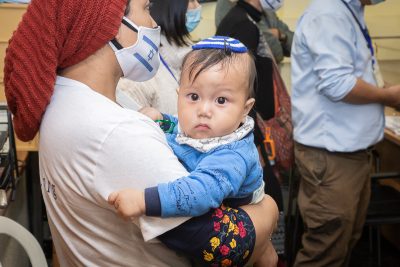×


We have detected your country as:
Please click here to go to the USA website or select another country from the dropdown list.
 My husband and I are moving in two days. We are downsizing to a smaller apartment in Jerusalem. I can tell you that moving is stressful. In fact, experts cite moving as one of the major stressors that people deal with. My apartment is full of boxes; there are piles of things to give away or sell, and I’m not sure we will be ready when the movers come.
My husband and I are moving in two days. We are downsizing to a smaller apartment in Jerusalem. I can tell you that moving is stressful. In fact, experts cite moving as one of the major stressors that people deal with. My apartment is full of boxes; there are piles of things to give away or sell, and I’m not sure we will be ready when the movers come.
This experience has given me great empathy for Israel’s immigrants. We are only moving from one apartment to another. They move from one country to another. In many cases they make this move without resources. Over the years, we have welcomed thousands of immigrants from many regions of the world. We have Russian, Hebrew, and Spanish speakers on staff who are able to communicate with many of the newcomers.
Tom and I will move into a nice apartment, and we have everything we need to live comfortably. And yet the move is stressful. Imagine the stress and worry that new immigrants feel when they move into an empty apartment, with no appliances or furniture and without the money to go out and purchase what they need. This is the situation of thousands of new immigrants each year. They step off a plane at Ben Gurion airport with two suitcases and nothing else except hope for a better future.
They often don’t realize that they are living fulfillments of biblical prophecy, and most of them don’t yet know that there are millions of Christians around the world who pray for them and are ready to support them in the beginning of their new lives.
Over the past 100 years, the Jewish people have been returning to their ancient homeland. They have come from over one hundred nations. Most of them have been descendants of the tribe of Judah and so are called Jews. Some are from the priestly tribe of Levi. The ten tribes from the northern kingdom of Israel were dispersed earlier, and are often referred to as the Ten Lost Tribes.
The Bible predicted the day when both groups, Judah and Israel, would return!
“He will set up a banner for the nations, and will assemble the outcasts of Israel, and gather together the dispersed of Judah from the four corners of the earth” (Isa. 11:12).
“In those days the house of Judah shall walk with the house of Israel, and they shall come together out of the land of the north to the land that I have given as an inheritance to your fathers” (Jer. 3:18).
Today, some of the descendants of Israelites from the northern kingdom are coming home to Israel. One such group is called the Bnei Menashe (Sons of Manassah). Michael Freund, the head of the Shavei Israel (Return to Israel) Charity, has been the mover and shaker behind their recognition, immigration, and absorption. After much negotiation, they have been given permission to come to Israel. The cost to relocate this people group will be huge—millions!
Michael describes the arrival of the first group in five years:
As the Uzbekistan Airways flight began its descent to Tel Aviv, over 50 pairs of eyes looked out the plane’s windows, anxious to catch a glimpse of their new home. For more than 27 centuries, their ancestors had wandered in exile, clinging to the dream that one day, despite the odds, they would somehow be able to return. And now, at last, that age-old ambition was poised to become reality, as 53 new immigrants from the Bnei Menashe community of northeastern India came in for a safe landing at Ben-Gurion Airport.
Who says we don’t live in an age of miracles? The Bnei Menashe are descendants of the tribe of Manasseh, one of the Ten Lost Tribes of Israel exiled by the Assyrian empire in 722 BC. Despite being cut off from the rest of the Jewish people for so many centuries, the Bnei Menashe remained dedicated to their heritage, stubbornly cleaving to the faith of their forefathers. They observed the Sabbath and kept kosher, celebrated the festivals, practiced the sacrificial rites and even argued a lot among themselves, just as Jews have done since time immemorial.
Indeed, the Bnei Menashe never forgot who they are or where they came from, or where they one day dreamt of returning.
Thanks to the help of many Christian friends like you, Bridges for Peace has been a significant partner in assisting the Bnei Menashe. This is in addition to assisting immigrants from many countries of the world. A few months, ago we told you about a group coming from Peru. They are now arriving in the city of Ramle.

All of these newest Israelis need everything. Imagine moving into a new home that is totally empty. Imagine that you have extremely limited resources. That is their reality. Your contributions to the Welcome Gift Program will help us to provide them with gifts of blankets, pots and pans and Bibles. Your gift to the Food Project will help us provide many new immigrants with food. Your contribution to the New Immigrant Fund will help us to meet some of their needs, including helping them to purchase much needed appliances.
The Bible says that Gentiles (nations) will help the people of Israel come back to their ancient homeland, “Thus says the Lord GOD: ‘Behold, I will lift My hand in an oath to the nations, and set up My standard for the peoples; they shall bring your sons in their arms, and your daughters shall be carried on their shoulders…’” (Isa. 49:22).
What a privilege to be among those that God has called to carry the children of Israel home on our shoulders. Please pray about joining us in this God-prophesied move. As God has blessed us, He now gives us the opportunity to share with those He is calling home to Israel.
No gift is too large! No gift is too small. Consider a generous gift of US$2,000 which will enable us to purchase a refrigerator, washing machine, and stove. We believe that God will multiply our gifts to meet the needs both of giver and recipient.
Blessings from Israel,
Rebecca J. Brimmer
International President and CEO
Photo Credit: Eleonora Shilova\Misrad Haklita
All logos and trademarks in this site are property of their respective owner. All other materials are property of Bridges for Peace. Copyright © 2025.
Website Site Design by J-Town Internet Services Ltd. - Based in Jerusalem and Serving the World.